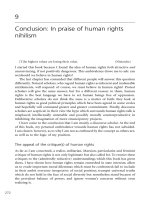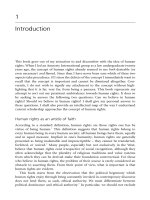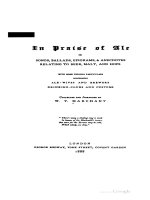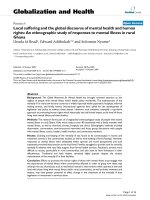Conclusion - In praise of human rights nihilism
Bạn đang xem bản rút gọn của tài liệu. Xem và tải ngay bản đầy đủ của tài liệu tại đây (2.58 MB, 13 trang )
9
Conclusion: In praise of human rights
nihilism
[T]he highest values are losing their value. (Nietzsche)
I started this book because I found the idea of human rights both attractive and
unconvincing, if not positively dangerous. This ambivalence drove me to ask: can
we/should we believe in human rights?
The last chapter has contended that different people will answer this question
differently. Natural scholars, who regard human rights as inherent and inalienable
entitlements, will respond: of course, we must believe in human rights! Protest
scholars will give the same answer, but for a different reason: to them, human
rights is the best language we have to set human beings free of oppression.
Deliberative scholars do not think the issue is a matter of faith: they look at
human rights as good political principles which have been agreed in some circles
and hopefully will command greater and greater commitment. Finally, discourse
scholars are sceptical: in their view the hype which surrounds human rights talk is
misplaced; intellectually untenable and possibly morally counterproductive in
inhibiting the imagination of more emancipatory projects.
I have come to the conclusion that I am mostly a discourse scholar. At the end
of this book, my personal ambivalence towards human rights has not subsided.
I am clearer, however, as to why I am not as enthused by the concept as others are,
as well as to the logic of my position.
The appeal of the critique(s) of human rights
As far as I am concerned, a realist, utilitarian, Marxian, particularist and feminist
critique of human rights is not only legitimate but also called for. To restrict these
critiques to the (admittedly reductive) understandings which this book has given
them, I have shown how human rights remain enmeshed in state interests; allow
us to evade important moral dilemmas which must be confronted; fail to include
in their ambit everyone irrespective of social position; trumpet universal truths
which do not hold in the face of social diversity but nonetheless stand because of
the prevalent balance of power; and ignore women’s concerns without even
realizing it.
272
These critiques are intimately linked, even if their presentation in different
chapters and their one-line summary in the previous paragraph could suggest
otherwise. From my perspective, the critiques overlap so much that they are
virtually the same thing.
1
This is so even though I recognize that each critique
can be seen as different from any other and that there are many different ways of
being a realist, a utilitarian, a Marxist, a particularist or a feminist. What I am
saying is that it is possible to feel one is a realist because one is also a utilitarian, a
Marxist, a particularlist and a feminist – and mutatis mutandis for each of the
other four terms.
2
I am not the first one to allude to the idea that these individual critiques feed
off each other. For example, in The Twenty Years’ Crisis (already quoted in
Chapter 3),
3
E. H. Carr chiefly presented himself as a ‘realist’, a label which stuck
as he later became recognized as a precursor of the realist movement which
developed in international relations after World War II. For him, ‘[t]he out-
standing achievement of modern realism . . . ha[d] been to reveal . . . the relative
and pragmatic character of thought itself’.
4
Such ‘relativism’ or ‘particularism’
regularly surfaced in the book, for example in the assertion that ‘“impartiality” is
a meaningless concept where there is no common ground at all between . . .
contending [worlds]’.
5
Carr also repeatedly acknowledged his debt to Marxism.
6
While he violently disagreed with Bentham
7
and simply did not think about
feminism, his work nonetheless shows how the five critiques reviewed in this
book could be seen to spring from the same source. To me, they represent
different ways of getting at the same thing.
Challenging the orthodoxy: In Nietzsche’s footsteps
What unites these critiques, at least in those variants of them which I find most
interesting, is a rejection of the human rights credo. They can all be used to take
issue with the Kantian affirmation, on which the human rights orthodoxy is
based, that ‘practical reason’ can guide us in moral matters. By accepting that
such a possibility is a delusion, they display what could be characterized as a
Nietzschean perspective.
8
Long shunned in courses on ethics, Friedrich Nietzsche (1844–1900) is now
regarded as an essential figure in the history of Western philosophy.
9
He is
popularly known for having attacked ‘almost everything that [was] considered
sacred: . . . God, truth, morality, equality, democracy, and most other modern
values’.
10
His name is forever associated with ‘nihilism’, a word which he himself
used in many different ways,
11
but which has at its core a reference to ‘the
devaluation of the uppermost values’. In Nietzsche’s words:
What does Nihilism mean? – That the highest values devaluate themselves. There is no
bourne. The aim is lacking; ‘why?’ finds no answer.
12
Conclusion 273
Why this devaluation? Johan Goudsblom explains its occurence through the
following two questions: ‘Have we not learned, as members of a civilized society
[inverted commas omitted in the original!], that we must be prepared to discuss
and examine the reason why we act the way we do? And yet do we not find, time
and time again, that not a single argument with which we may wish to justify our
judgments and decisions can withstand critical analysis?’
13
This is the dilemma
from which nihilism emerges. According to Nietzsche, Alan White remarks,
‘thoughtful human beings [would] of necessity be nihilists – and the thoughtless
as well, although they [would be] less likely to know it’.
14
Nihilism is often misunderstood as entailing a rejection of morality. This is not
the best way of understanding Nietzsche’s philosophy. To quote Goudsblom
again:
[Nietzsche] felt summoned to a task which no one had yet dared to undertake: the
investigation of morality as a problem. He writes that the real moralist can be
distinguished from the puritan in that the former dares to make a problem of
morality ...Ifwedonotwishtolapse into new moral prejudices, then we have to
take up a position outside morality, somewhere beyond good and evil . . . [A] right-
minded philosopher does not subject himself to the dictates of morality. He plunges
the vivisectionist’s knife into the virtues of his time. The moral distinction between
lies and sacrosanct lies is alien to him; he discriminates between truth and lies – and
he goes for the truth.
15
In fact, Nietzsche, especially towards the end of his life, was calling for new values
to be created, especially through the interpretation of old values in a life-affirming
way. Many approach him today as an ‘impassioned and dedicated moralist’.
16
In
the words of Simon May, for example, ‘Nietzsche is a thinker who not only
repudiates traditional conceptions of god, guilt, asceticism, pity, and truthfulness,
but also retains a severe ethic of discipline, conscience, “self-creation”, generosity,
and honesty.’
17
Having said this, Nietzsche obviously does not provide any philosophical, moral
or intellectual recipe which could be followed step by step. This is in line with the
fact that he ‘argues for a plurality of perspectives, a plurality of “truths” . . .
with none of them the “true” one’.
18
As Robert Solomon usefully remarks, this
is not that such ‘perspectivism [amounts to] the view that an opinion is as
good as every other but rather that an opinion is only as good as its author, as
meaningful as the thought that goes into it and the energy and sincerity that
motivate it’.
19
Why be afraid of human rights nihilism?
‘Nihilistic thought seeks to show that metaphysical “truths” simply express the
subjective values of a given individual or social group, not the immutable,
unchanging essence of either the divine, human or natural world.’
20
This, of
274 Who Believes in Human Rights?
course, is exactly what I have tried to show in respect of human rights orthodoxy.
Human rights are most commonly represented as given – inherent and inalien-
able. Against this stance, I have intimated that human rights is a ‘system of
persuasion’, a ‘kind of rhetoric’, an ‘expression of the will to power – even to
domination – of those making the [human rights] truth-claims over those who
are being addressed by them’.
21
While I am not the only one to take this stance,
I am in a minority.
My view is that human rights nihilism is healthy and necessary – even if it
seems to open an abyss. It is true that it immediately gives rise to the question:
what will happen and what should you do if you let go of human rights?
22
Can
you even let go of the concept? I certainly have not dared to, and continue to
defend human rights as ‘strategically useful’. What would Nietzsche have said?
I am not sure, but I am clear that he would have looked for a re-evaluation of the
devalued values.
In a different but ultimately similar way, Carr the realist called for a ‘combina-
tion of utopia and reality’.
23
He noted that realism is liable to result in ‘the
sterilization of thought and the negation of action’ when it assumes a purely
‘critical and . . . cynical aspect’.
24
In his view, realism’s barrenness needs to be
corrected by its contrary, utopianism.
25
In his words,
[T]he realist, in denying any a priori quality to political [values], and in proving them
to be rooted in practice, falls easily into a determinism . . . [He] runs the risk of
treating purpose merely as the mechanical product of other facts. If we recognize that
this mechanization ...isuntenable and intolerable, then we must recognize that
theory, as it develops out of practice and develops into practice, plays its own
transforming role in the process.
26
At the end of this book, I have no programmatic statement to make about human
rights, the political process, justice or human life. I do not see this as a weakness.
I feel the more justified in my ‘nihilist’ critique as I am writing these lines in July
2005, days after four bombs exploded in London. ‘Our values and our way of life’
are being celebrated by Prime Minister Tony Blair and others as if what these
notions entail were clear and ‘we’ were unequivocally on the side of ‘good’ against
‘evil’. But what ‘we hold dear’, to quote another phrase used by Blair, cannot be
simplified to a glorified mantra of inherent, universal and inalienable human
rights – which fall so short, in practice, of what they proclaim. Needless to say, this
is said with no sympathy either towards terrorism – from whichever direction it
emanates, with or without the seal of state approval – or towards the erosion of
civil liberties.
I was privileged to teach for a few years at the Vrije Universiteit Brussel LLM
students who came from the four corners of the world. The course aimed at
making them think about what place was left to non-Western legal perspectives in
a global world dominated by ‘the West’. The students reported they found the
course intellectually challenging and emotionally intense. I used to tell them that
Conclusion 275
I was hoping that they would remember our class discussions when, in the future,
they might be in a position to make decisions which matter. In the same way, this
study does not aim at revolutionizing the world. If it can influence readers,
especially but not only those in the orthodoxy, to think twice before they assert
their confidence in human rights, it will have achieved its political aim.
Notes
1 Let me repeat that other critiques of human rights which have not been explicitly
discussed in this book, for example inspired by communitarianism and critical race
theory, could easily have been added to this study. In a sense, they also amount to
‘the same thing’.
2 Thus one feels a utilitarian because one is also a realist, a Marxist, a particularist and
a feminist, etc. For a challenging utilitarian morality which goes against the grain of
our moral ‘intuitions’, see Jonathan Glover, Causing Death and Saving Lives (London:
Penguin, 1990), esp. Chapter 20.
3 E. H. Carr, The Twenty Years’ Crisis, 1919–1939: An Introduction to the Study of
International Relations (Basingstoke: Palgrave, 2001).
4 Ibid., at 65, emphasis added.
5 Ibid., at 181. This passage refers to the impossibility of finding a ‘single impartial
judge in the whole world [when, in the words of a representative of the
Soviet Government in 1922,] there was not one world, but two, a Soviet world and
a non-Soviet world’: ibid.
6 ‘Marx’ or ‘Marxism’ appear no less than 24 times in the index of Twenty Years.
7 Ibid., at 26 and 28. For the way in which Carr’s life came to represent ‘the unmaking
of a liberal’, see the introduction by Michael Cox to the 2001 re-edition of Twenty
Years, at xiv-xix.
8 Admittedly, the debate as to whether Nietzsche’s work is antagonistic to the Western
philosophical tradition or is in direct continuation with it is not closed: Robert
C. Solomon, ‘Introduction: Reading Nietzsche’, in Robert C. Solomon and
Kathleen M. Higgins (eds.), Reading Nietzsche (New York: Oxford University Press,
1988) 3–12, at 11.
9 Solomon, ‘Introduction’, at 3.
10 Maudemarie Clark, ‘Nietzsche, Friedrich (1844–1900)’, Concise Routledge Encyclope-
dia of Philosophy (London: Routledge, 2000) 630–1, at 630.
11 Thus, he distinguished between ‘active’ and ‘passive’, ‘theoretical’ and ‘practical’ and
‘complete’ and ‘incomplete’ nihilism. For other forms of nihilism to which Nietzsche
referred in his work, see Alan White, Within Nietzsche’s Labyrinth (New York:
Routledge, 1990), at 15.
12 Friedrich Nietzsche, The Will to Power, transl. by Walter Kaufmann and R. J.
Hollingdale (London: Weidenfeld and Nicolson, 1967), at 9.
13 Johan Goudsblom, Nihilism and Culture (Oxford: Blackwell, 1980), at x.
14 White, Nietzsche’s Labyrinth, at 15.
15 Goudsblom, Nihilism, at 24, emphasis in the original, references omitted.
16 Solomon, ‘Introduction’, at 5.
17 Simon May, Nietzsche’s Ethics and his War on ‘Morality’ (Oxford: Clarendon, 1999),
at v. For an assessment which some would find more balanced, see Lester H. Hunt,
276 Who Believes in Human Rights?









